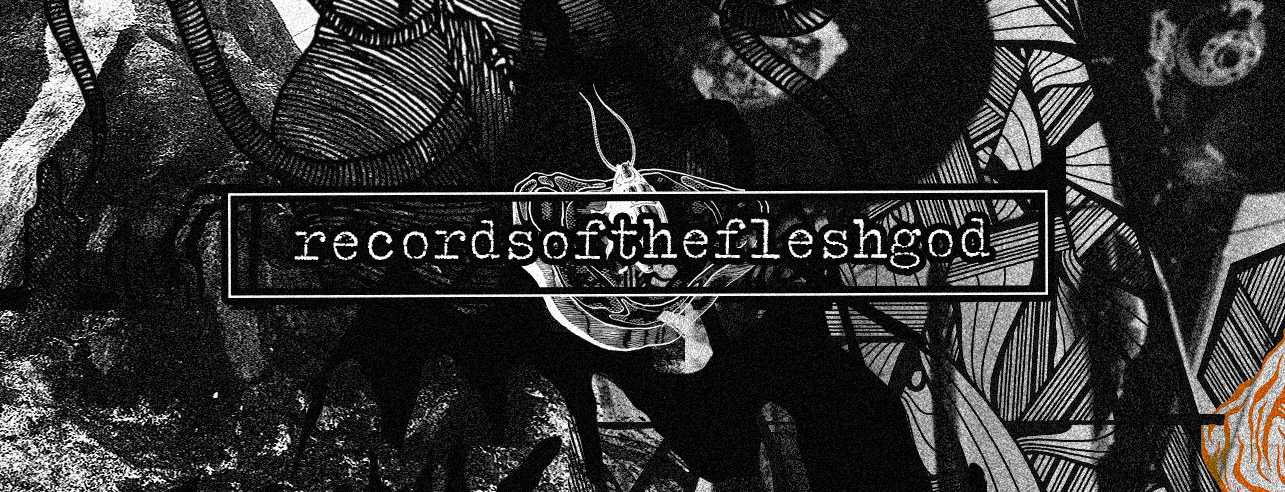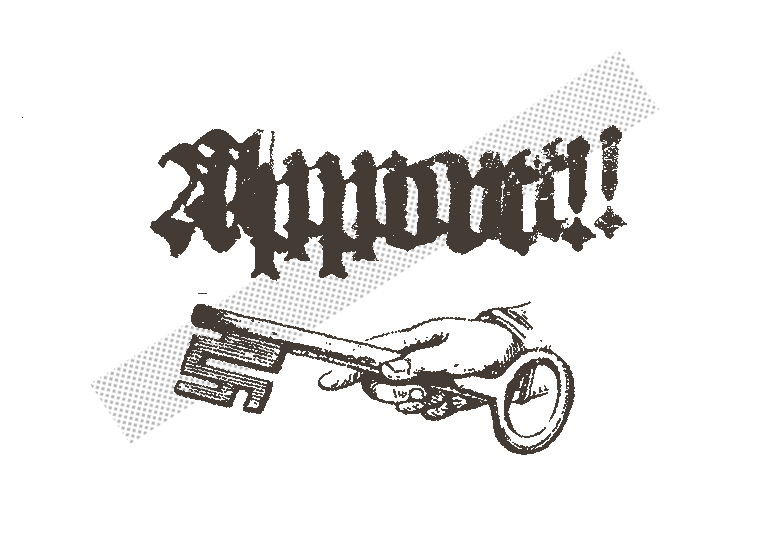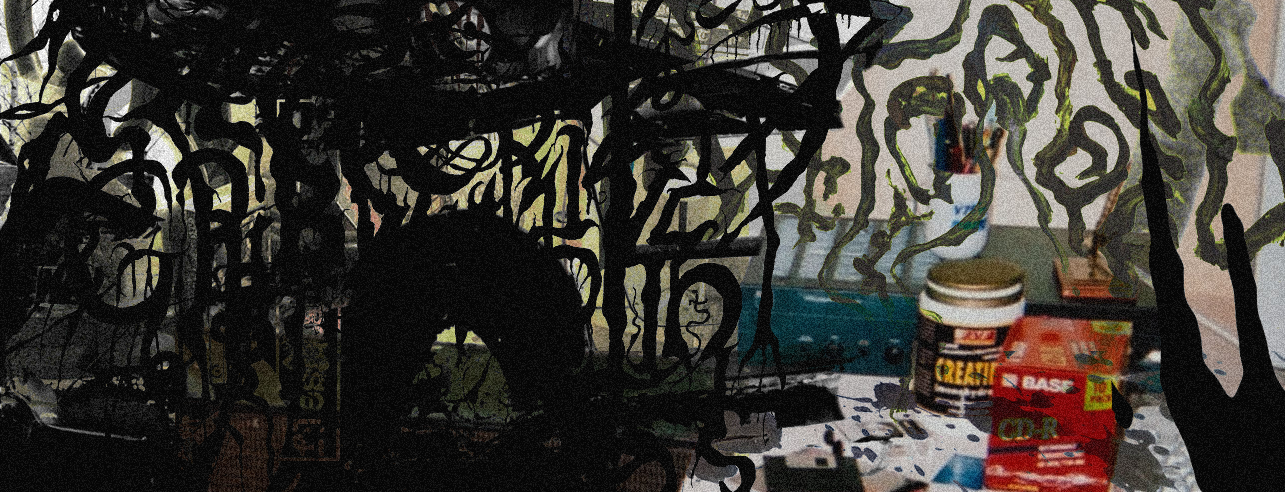
The interview again. This time – with the label from Oslo, Norway: ROTFG/ Records Of The Fleshgod. This one caught our attention a quite time ago and after some contacts Apport! decided to dive deeper into this strange musical swamp. The genre-defying approach of ROTFG is a particular trait of this label. One can find here strange, distorted hip-hop, noisy experiments, skull-crushing drone doom, and more. Thus, we decided to spread the word. The whole interview (accompanied by the mix from their releases WHICH YOU CAN LISTEN TO HERE ) with Jørgen and Sindre goes below:
Hello, let the first question be a little bit banal one – since there’s a need to introduce the Records of the Fleshgod. Please share a few words about who you are and what you do.
Jørgen: We are a small artist-driven record label from Norway, originally based in Oslo but now also in Arendal. Originally created to release our own music, first Tri-Function Million – Sprukket Jord, we have since released other projects and also from other people, both local and some from other countries. It was also meant to work as a hub for our diverse projects, since we sometimes do one-offs that will otherwise easily disappear in the maelstrom of other releases.
Sindre: As Jørgens says we primarily needed a place to put out our own music. In our circle there was a lot of experimenting with music and sound art coming from many different angles and nothing was genre specific. When the label finally started to release physical media it had existed as a state of mind so to speak for many years.
What got our attention about ROTFG is that label is not tied to some kind of musical style. It is genre-defying, concentrating on the music it likes. And as we share this attitude, it hooked up immediately. Do you share the idea, that quite often a stubborn devotion to some kind of subculture simply kills the potency of someone’s music? I am not “against” subcultures, but not so rarely I also see a tendency, when one tries to belong to some of them while sacrificing originality.
Jørgen: Well, yes and no. I think stagnation can strike anyone regardless of their devotion to one genre or lack of it. Personally I think originality is essential, to me, that includes not repeating oneself too much either. But I also work with people that do not care for originality but would rather focus on refinement of a certain thing. Both approaches can yield great music.
Sindre: I think for us it came very naturally. Instead of searching for genre specific underground labels to release our different projects why not combine it all into one vortex. Still i also follow and appreciate a lot of niche labels and bands that has that fanatical and narrow focus on specific corners of a genre. When you narrow it down to such limited parameters and work to max out what you can do within those limits lots of interesting things can happen, but it is just not for us.
Although ROTFG is not tied to some genre, there are some spectrum of styles label operates. It dwells in the area of doom metal, noise, P.E., hip-hop, widely understood experimental and you-name-it projects. Actually, yes quite an underground thing. But let’s concentrate on the hip-hop accent now. The first records of the ROTFG I’ve heard were actually from this genre, mixed with the industrial feel (Fedrelandslaget and Tri-Function Million). It works miraculously great, but as far as I see, there’s quite a shying away from hip-hop and related things in the so-called “industrial” scene. Why do you think it is like that? Why, for example, mixing this with some metal is kinda more “legit” than mixing it with darker beats? A stagnation of the beforementioned subcultural dogmas maybe? Why some of these dark industrialists are “afraid” of hip-hop sounds?
Jørgen: I think a lot of it has to do with values and how hip-hop is perceived. Mainstream rap is unapologetically commercial and many find that vulgar. Perfectly understandable to me. When I got into rap it was all about dirty beats, hard raps and staying true, not selling out etc. I don’t think a lot of young rappers and producers even know what selling out means anymore, as that is kinda their starting point haha. I have had a love/hate relationship with the genre for a very long time. There are good things happening in the genre now, but I have had periods of years when I have barely listened to rap at all.
Sindre: I think that underground metal and industrial share a bit more common ground in sense of aesthetics and themes as well as cultivating a more clandestine approach to what you could call “scene” or community. While a lot of metal and noise/industrial cultivates obscurity and anonymity there seems to be mostly about the exact opposite in hip hop. As much as i personally enjoy a lot of rap music there is a sense of fatigue seeing that hip hop has completely taken over almost every aspect of mainstream culture today and sometimes one needs to just get away from it. Nevertheless, just because of this huge gap between the cultures i think there are a lot of interesting things that can be explored in throwing these genres together and i am sure we will have some good music come that explores these fields furter in the future.The combination of rap and metal on the other hand has led to abominations beyond salvation.
Jørgen: There have indeed been some really bad precedents over the years. But when you go back to 90s, early 2000s you can find some overlap between hip-hop and industrial. Like Rubberoom, Curse of the golden vampire or Techno Animal. Also if you listen to some industrial acts like Skinny Puppy, it’s not really a huge gap sonically between that and a lot of early to mid-nineties european rap, to my ears anyway.
We do not speak Norwegian, so why on earth do we like and listen to such projects as Gylne Rune, Martin Massiv, Tovanski, Kyber, and the beforementioned ones Fedrelanslaget, Tri- Function Million, etc.? 🙂 And while speaking about lyrical themes, besides civilization and urbanistic ones, it seems that some of them are oriented more in a “nature” direction, am I right? (as Gylne Rune for example).
Jørgen: I don’t know! Haha. For some reason we have always had listeners abroad. But we have always tried to keep the musicality in the forefront of our projects though. That said I enjoy the occasional french, german or polish rap myself even though I don’t speak the languages.
The themes are very varied across the projects. Gylne Rune has some shamanistic and mythological aspects to him, Tri-Function Million have a lot of dystopian and I guess typically industrial themes amongst other things, Fedrelandslaget has some abstract violent madness that is hard to decipher, Tovanskï and Martin Massiv are probably those who have the most deeply personal lyrics.
Sindre: Listening to music in a foreign language often opens up the imagination. It is easier to focus on the phonetic delivery of voice rather than the lyrics, while at the same time of course both vocal style and aesthetics of the release will give a certain feel to it.
There are projects on your catalog that have one release only and nothing more. (Pestorgel, Compost Golem etc.) Do they’re a kind of one-time project or “time will show” if there will be something in addition? Speaking about the noise/power electronics/experimental releases, they also take a quite big part of ROTFG’s catalogue. Some of them tend to step into more “strange” areas (as Lasers of the Inquisition, and my favorite split between Niklas Alexander Marritt & Nordens Dødsmyter). Sure, they are “noise”, but at the same time, they manage to not fit into typical noise/p.e. subculture boundaries. Do you agree with such an observation? And what overall you could say about such a genre’s place in the ROTFG microcosm?
Jørgen: Some of the one-offs are definite one-offs, others might or might not get revisited. There really are no rules to this and rarely a formulated plan. As for the music not fitting comfortably within the boundaries of a genre that is just how it comes out a lot of the time and it forms the basis of the label. There are plenty of labels already for people who do pure black metal, pure harsh noise, pure hip-hop or whatever. Actually I think it’s kind of sad that “noise” as a genre has gotten increasingly more specific, it used to be more of a marker of approach or intention. At least that was my interpretation of it back in the day.
Sindre: Some of the one offs also is “demo phase” that grew into new projects that needed a new name for when the concept was sharpened. Also some of the projects that were essential to starting the label was made because noone else did sound exactly like that-i think we still hold on to that principle, even if not dogmatic.
Quite chrestomathic Norway is often associated with black metal. What do you think about that and what are your relations, opinions, and tastes about this genre? To be sincere all these “raw” records are more my cup of tea instead the crystal-clearly recorded “modern” ones.
Jørgen: We all love black metal, many of my all time favourite albums belong to the genre. It is also a great example of both how stagnation can (almost) kill something and at the same time there will always be new bands coming that are super dogmatic and still sound fucking great. I think the trap here is caring too much about “professional sounding good production” whatever that is. Same for all music really. There is a great divide in the population the way I see it, in understanding of mixing and sound.
Sindre: My collection consists of i guess 70% black metal. While in the early days i listened a lot to the norwegian nineties bands, but since ca 1996/7 norwegian black metal was stale and boring with studio budgets, producers and unhealthy interest in “the Matrix” or some garbage like that. But around the world there was always fanatical maniacs who made cruel and insane satanic noise for those who wanted to dig around. There are a few good bands here of still, but the dinosaurs of the nineties has mostly been irrelevant for almost 30 years now. If you want raw and crude metal from Norway there is better to hunt for some thrash and death metal mostly. I can recommend the new Askeregn album if you want to listen to some new Norwegian black metal that sounds good, and Abhorration and Impugner for some new death metal filth.
Why such a name for the label and what’s the meaning behind it?
Jørgen: The name of my studio was Temple of the Fleshgod, I can’t remember how that started, but it was a continuation of that. In general I can say I enjoy leaving things open ended and up to interpretation.
Speaking about an experimental/electroacoustic/noise/etc. music, would you agree that Scandinavians have some kind of a distinct “sound”? I mean not a specific one that could be heard in all the music, but that ability to craft the sounds into something interesting and listenable.
Jørgen: I have no idea. When I was younger I remember thinking that maybe something evil was buried in our soil, but as I have gotten older and more familiar with music from all over the world I think that evil must be buried everywhere in that case.
Sindre: This is a huge topic for sure and i have not enough competence to answer in full. Regarding noise music, i think there is something i often can recognize as Swedish or Finnish but im not too sure about Norwegian sound. For the more rotten and vile noise/industrial i think both the other coutries have more to offer as specific sound of scenes come. For the more academic sound art field we have the huge shadow of Arne Norheim here in Norway of course. I guess in Norway the two larger scenes are either the more academic side of contemporary composers and then more “basement” scene with free impro people. But i think the countries differs a lot and in several ways too, and i can recognize something as swedish or finnish in certain styles, but i have no distinct norwegian sound to point out in these genres, and for sure not a scandinavian one. But perhaps we are too close to see.
As far as I understand, ROTFG also organizes some live shows. Am I right? Because I’ve seen a few announcements on Facebook. What is the overall situation with these concerts? Is it difficult to find the venue and is it possible to guess the number of people that will come? And these live shows are mostly from local artists, yes?
Jørgen: We did, and we probably will again. Usually it has been local acts, though we have teamed up with others to bring artists from abroad in the past. We also had a yearly summer event going for several years that we will hopefully revive at some point. Finding a venue has rarely been a problem as we have some good supporters in Oslo. Numbers of people in the audience varies, usually somewhere between 20 and 50 I think?
What do you find the most difficult thing while putting out a physical format ?
Jørgen: Selling them afterwards, we are not very good sales people.
Sindre: Amen.
There was some kind of gap of silence until the last release – Kyber “Biomasse”. What was the reason for that? Personal things, tiredness, everyday life things, or something other? And overall, do you question yourselves sometimes, what is the reason for doing all this? And what motivates you to continue doing things?
Jørgen: Exhaustion on my part is some of it. I worked way too long on that album and releasing it was anti-climactic like I knew it would be. Not that I am not happy with it, but when something has been many years in the making it gets like that.
Sindre: A lot of this had to do with logistics. The projects/people involved in ROTFG have played a lot live so we relied on selling products to people hand to hand and there has been some years without much possiblities for gigs because of the plague..plus people involved moving to different cities and houses took some time etc.
I question this a lot of times because sure as hell we are not doing this for financial gain.
Jørgen: The reason for doing this has always partly been to put out the releases that we feel are missing, I don’t think that will change. I have been on the verge of calling it quits a couple of times before, but it never lasts long.
Any Plans? Ideas? Spiritual practices? Clairvoyance for ROTFG? Yeah, any last words, hopes, or curses.
Sindre: We just co-released the new Gribberiket album with Dead Seed Productions from France, so we are currently planing to get copies of this out to distributors. Few more releases are in the making, but not any set date for release. We will slither around in the pits of the underground for a long time still, it is a part of life. Thanks for the interest!
Jørgen: Well, I think we will continue for a good while yet putting out new releases. We are currently trying to get more away from social media and get people who are really interested to join our mailing list instead. If I have a curse it’s for social media and how the largest actors have usurped communications between people piece by piece with a lot of people still being ignorant of this fact. In other news, it seems Noisestar and the Fall of Rome will have a new release soon.
RECORDS OF THE FLESH GOD www: https://rotfg.com/
ROTFG Bandcamp: https://recordsofthefleshgod.bandcamp.com/
ROTFG Soundcloud: https://soundcloud.com/recordsofthefleshgod
ROTFG Facebook: https://www.facebook.com/recordsofthefleshgod





